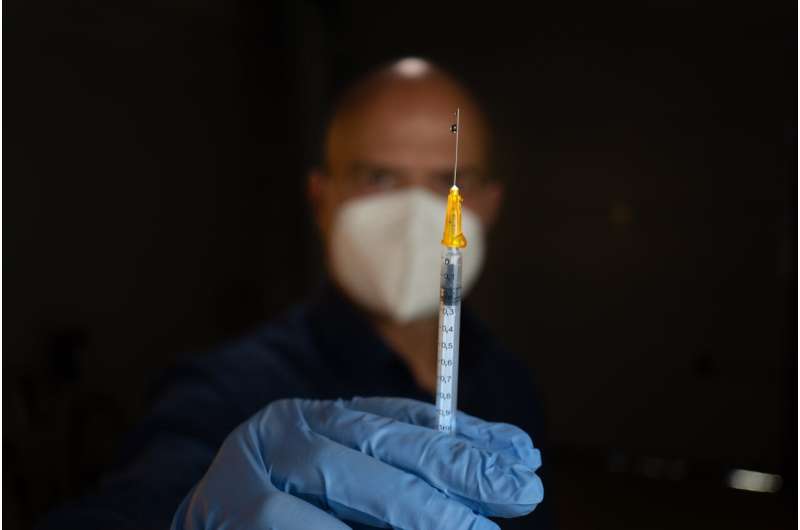Why people should be vaccinated for COVID-19: Questions answered

The latest data from the U.S. Centers for Disease Control and Prevention (CDC) indicates that only a third of all pregnant women in the U.S. are fully vaccinated against COVID-19, yet they are among the most vulnerable who are likely to experience severe complications from the deadly virus. Black and Hispanic women who are pregnant could be at even higher risk, according to Michelle Albert, M.D., M.P.H., FAHA, volunteer president-elect of the American Heart Association and current president of the Association of Black Cardiologists.
"The CDC reports that only 33% of pregnant women have gotten the vaccine. Among those, only 18% are Black women and 28% are Hispanic women," said Albert, a professor of medicine at the University of California at San Francisco (UCSF), Associate Dean for Admissions for UCSF Medical School and a newly elected member of the National Academy of Medicine. "People need to know the complications of the virus are much worse than risks of the vaccine. You need to be vaccinated to protect yourself, your unborn child, your family and your community."
As a clinician-scientist, Albert has devoted her career to researching health disparities among historically excluded people. She is currently studying the impact of the COVID-19 pandemic among Black women through a research grant funded by the American Heart Association's COVID-19 Rapid Response initiative. She said it's important to set the record straight on the health benefits of COVID-19 vaccinations for pregnant women and people of color at a time when misinformation is increasingly seen as a problem among Americans.
"Please use your trusted sources. You should trust your doctors and your other health care professionals to provide you with appropriate information around COVID-19," Albert said.
The American Heart Association, the world's leading nonprofit organization focused on heart and brain health for all, is supporting vaccination efforts and believes that following science-driven guidance is critically important.
'As a pregnant woman, should I get the vaccine?'
Research shows COVID-19 can increase complications for pregnant women—significantly raising their odds of needing ICU care, premature birth and death, especially when compared to pregnant women without COVID-19.
Studies have shown that the vaccine is safe for women who are pregnant and they are no more likely to experience miscarriages than women who are not vaccinated.
Albert not only encourages those who are pregnant to get vaccinated, but also women who are wanting to become pregnant.
"The COVID-19 vaccine has not been shown to result in fertility problems in women or in men. The vaccine is safe," noted Albert.
The CDC issued an urgent health advisory urging more vaccinations of pregnant people to protect the lives of those who are or may become pregnant, and to keep their fetuses safe and healthy, too.
'Why are people of color at higher risk for severe cases of COVID-19?'
Research has found that people with a history of cardiovascular disease and cardiovascular disease risk factors are more likely to experience more severe complications if they get COVID-19—that includes people who have had a heart attack, stroke or those with heart failure, or among those who smoke or have high blood pressure or obesity.
According to the American Heart Association's Heart Disease and Stroke Statistics 2021 Update:
- About 60% of Black men and women over the age of 20 have some form of cardiovascular disease.
- About 52% of Hispanic males and 43% of Hispanic females have some form of cardiovascular disease.
- Among adults reporting they smoked at least once a day, 22.6% were American Indian/Alaska Native people, 14.6% were Black people and 9.8% were Hispanic people.
- More than 77% of Hispanic adults and 70% of Black adults over the age of 20 have obesity,
- More than 57% of Black adults and more than 41% of Hispanic adults over the age of 20 have high blood pressure.
"The factors that contribute to the heightened risk for COVID-19 include cardiovascular comorbidities, crowded housing environments, more likely to work in service jobs where people are unable to socially distance, lower socioeconomic status and poor-quality health care. These are all factors that contribute to the worsened risk and are all factors of systemic racism experienced by people of color that increase their risk," Albert said.
'Some people have gotten COVID-19 despite being vaccinated, so why should I bother getting it?'
"Of the millions of people who have been vaccinated for COVID-19, very few have breakthrough infections, although breakthrough infections do occur, the key point is, at least 92% of persons who are hospitalized, seriously ill or have died of COVID-19 have not been vaccinated," Albert said.
Compared to people who are fully vaccinated against COVID-19, research shows unvaccinated individuals are:
- Five times more likely to contract the virus;
- 10 times more likely to be hospitalized with the virus
- 10 times more likely to die from complications related to the virus.
"COVID-19 is an inflammatory condition, so likely what is happening is that the inflammatory environment built up by the virus propels medical conditions that can result in death," Albert said.
The American Heart Association aligns with the CDC's recommendations that everyone eligible, ages 12 and older, be vaccinated as soon as possible. The goal is to protect as many people as possible from severe COVID-19 infection, hospitalization and death —especially younger children who are not yet eligible for COVID-19 vaccination and people who have compromised immune systems due to other serious health conditions.
The COVID-19 vaccines are safe, effective and available to everyone (currently 12 and above) at no cost.





















